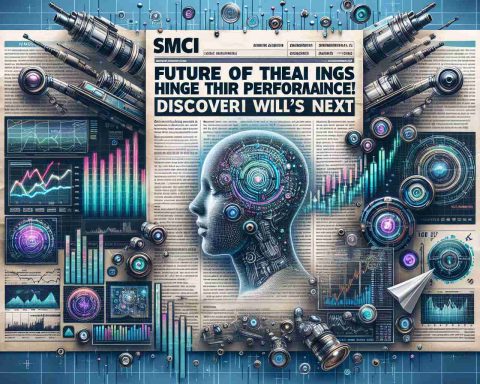New Technology Brings Opportunities and Perils
The excitement generated by the rapid advancement of artificial intelligence continues to captivate investors, with companies like Super Micro Computer at the forefront. But a recent scandal shines a glaring spotlight on the darker side of these tech-driven opportunities, suggesting that the ride to profitability may not be as smooth as anticipated.
Scandals Highlight Industry Vulnerabilities
Super Micro Computer, a company riding the waves of AI infrastructure demand, finds itself in a complex quandary. Accusations of financial manipulation and the resignation of its auditor, Ernst and Young, have sparked discussions about the reliability of the company’s financial health. The impact has been palpable, reflected in a significant dip in stock value. Investors are left pondering whether benefits from AI eclipses these potential pitfalls.
Understanding the Ripple Effect
The issue raises broader concerns about the tech industry, where breakneck innovation sometimes outpaces regulation and oversight. This case underlines the necessity for vigilance and comprehensive scrutiny as investors balance allure with potential adversity.
Investor Strategies in the Tech Sector
As Supermicro seeks a fresh auditor amid ongoing federal investigations, the situation offers critical lessons for investors. In an ever-evolving market landscape, the ability to discern genuine growth prospects from speculative ventures is increasingly crucial. Diversification remains a cornerstone of risk management, helping investors withstand shocks from isolated incidents like Supermicro’s present predicament.
As the tech sector continues to drive unprecedented progress, understanding the interplay between innovation and ethics will be vital to harnessing opportunities without falling prey to their risks.
The Dual Impact of AI: Opportunities and Challenges
The ongoing buzz around artificial intelligence (AI) advancements is a testament to its potential to revolutionize industries and improve quality of life on a global scale. However, recent incidents spotlight significant challenges that accompany this rapid technological progress. Particularly, the financial scandal involving Super Micro Computer has highlighted vulnerabilities within the tech industry, emphasizing that the road to profitability might be fraught with unexpected obstacles.
The Environmental Impact of AI Advancement
AI’s role in reshaping the world extends beyond financial markets and technological breakthroughs. The development and deployment of AI technologies can have profound implications for the environment. On one hand, AI can drive efficiencies in energy consumption, optimize logistics, and contribute to sustainable resource management. By analyzing massive datasets, AI systems can identify patterns that help reduce carbon emissions, enhance renewable energy use, and promote sustainable practices in agriculture and industry.
However, the environmental benefits of AI are counterbalanced by significant challenges. The energy consumption of large-scale AI models, particularly those used in training complex neural networks, is substantial. Data centers powering these AI advancements require vast amounts of electricity, often derived from non-renewable sources, leading to increased carbon footprints. The rapid production and disposal of hardware required to support AI also create electronic waste concerns, adding further environmental pressure.
Implications for Humanity and the Economy
For humanity, AI’s dual capacity to both address and exacerbate environmental issues raises critical questions about sustainable development and ethical responsibility. The potential to unlock solutions to core environmental challenges could reshape how societies interact with nature, potentially leading to cleaner, healthier, and more resilient communities. However, if technological advancement continues without suitable regulatory frameworks and oversight, the negative environmental impacts could offset the progress achieved.
Economically, AI offers transformative opportunities—boosting productivity, driving innovation, and opening new markets. Yet the recent scandal in the tech sector underscores the complexity of realizing these benefits. Financial uncertainties linked to rapid AI integration can lead to market instability, affecting investors and stifling innovation if confidence falters. The need for clear regulations, transparency, and ethical guidelines in AI’s deployment is crucial to ensure that economic benefits are evenly distributed and sustainable.
Future Connections and the Path Forward
As humanity looks to the future, the integration of AI into various sectors must be managed with a balanced approach that weighs opportunities against environmental, social, and economic risks. Key to this is fostering collaboration between technologists, regulators, and civil society to develop AI solutions that prioritize sustainability and ethical use.
Investments in research to enhance the energy efficiency of AI systems, along with innovative approaches to reduce electronic waste, can pave the way for a more sustainable tech landscape. Encouraging corporate accountability and transparency within the tech industry can prevent scandals and protect investors’ interests, bolstering long-term confidence and investment in AI-driven solutions.
Ultimately, understanding and addressing the interplay between AI, the environment, and society will shape the future of human development. By harnessing AI responsibly, the world can unlock unprecedented potential to overcome critical global challenges and build a resilient future.
The Invisible Risks in AI Investment: What Investors Must Know
The emergence of artificial intelligence (AI) as a dominant force in the tech industry is an undeniable trend reshaping numerous sectors. However, recent revelations have highlighted both opportunities and inherent risks. Companies like Super Micro Computer have been pivotal in advancing AI infrastructure, yet their recent scandals have exposed vulnerabilities that demand investor attention.
Pros and Cons of Investing in AI-driven Companies
Pros:
1. High Growth Potential: AI technology is at the cutting edge of innovation, promising exponential growth as adoption increases across industries.
2. Diverse Applications: AI’s versatility allows for deployment in varied fields, including healthcare, finance, and transportation, ensuring multiple revenue streams.
3. Competitive Advantage: Companies leading in AI often gain a significant edge over competitors by offering enhanced efficiency and new capabilities.
Cons:
1. Regulatory Uncertainty: Rapid innovation often outpaces legislation, creating a volatile environment subject to unexpected regulatory changes.
2. Ethical Concerns: Issues around data privacy, bias, and transparency can pose reputational and legal risks.
3. High Competition: The competitive landscape is fierce, with multiple players striving for dominance, making it a challenging arena for sustained leadership.
Market Analysis: Navigating the Tech Sector Storm
A thorough market analysis reveals the need for a cautious approach when investing in tech firms currently embroiled in controversy. The Super Micro Computer incident underscores the importance of resilience strategies. Diversifying investments and conducting due diligence on the financial and ethical practices of companies is paramount.
Security and Innovation Balance
Security aspects in AI technologies are of increasing importance. Innovations must be balanced with robust security measures to protect against breaches and misuse. Companies that invest in security protocols offer more stable investment opportunities, reducing risks associated with some of the industry’s setbacks.
Predictions for AI’s Financial Landscape
Despite current controversies, the AI sector’s financial outlook remains promising. Analysts predict continued investment inflows, driven by the technology’s transformative potential. However, a shift towards more stringent scrutiny and ethical considerations is anticipated, as regulatory bodies and investors demand more transparency and accountability.
The Role of Investor Education
For investors looking to make informed decisions, education on AI trends, risks, and ethical considerations will be crucial. Leveraging resources and expert insights, such as those offered by reputable sources like Forbes, provides a comprehensive understanding of the AI landscape for smarter investments.
Investor strategies in the tech field must adapt to harness AI’s vast opportunities while understanding and mitigating the associated risks. The ongoing developments with Super Micro Computer are a reminder of the intricate balance between innovation and ethical investment practices.


















